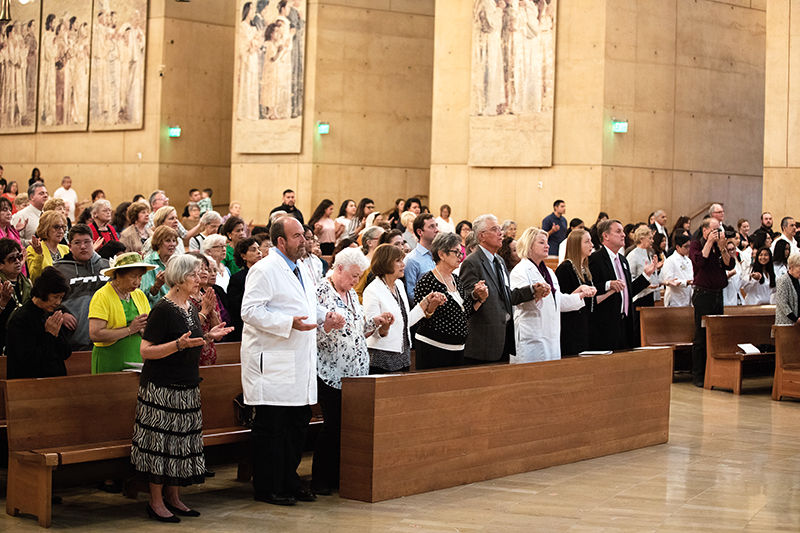On Oct. 23, we celebrated our annual White Mass for those in the healing professions of medicine and health care at the Cathedral of Our Lady of the Angels.
As we know, Christians have been doctors and nurses from the earliest days of the Church. Before Christianity, the healing arts were practiced by self-taught individuals who traveled from town to town. Christians invented the hospital and were the first to establish medicine as a profession, with standards for training and care and a commitment to medical research.
From the beginning, Christian doctors served everyone, regardless of religion or social status, and they refused to turn any patient away — even those with highly contagious diseases.
Historians tell us that Christians were the only ones who cared for the sick and dying during the plagues and epidemics that afflicted the late Roman Empire. Many of them died from diseases they contracted from their patients.
Something else distinguished early Christian doctors — from the beginning they refused to take part in abortion, infanticide, birth control, assisted suicide or castration, all of which they considered bad medical practice and contrary to the truths of the Gospel.
These basic commitments continue to distinguish Catholic and Christian doctors and nurses. But these are challenging times in health care.
Everyone agrees that serious flaws have been exposed in the federal Affordable Care Act — insurance costs are rising dramatically for individuals and employers and doctors face new pressures in treating patients and carrying out their responsibilities.
Assisted suicide legislation is advancing in New Jersey and the District of Columbia. Colorado voters will decide in November whether to legalize the practice in their state.
In the few months since California’s new assisted suicide law took effect, we have already seen the first public case of something lawmakers and advocates promised would not happen. A terminally ill woman was denied insurance coverage for the chemotherapy treatment her doctor recommended, although her insurance did offer to cover suicide drugs.
We must continue to oppose assisted suicide as an unjust and dangerous public policy. It gives “end of life options” to those who already have the privilege of good health care. But for the poor, it will make suicide by prescription the “recommended” or only option. In fact, this year’s California budget includes $2.3 million to subsidize giving lethal drugs to the poor through the Medi-Cal system.
Assisted suicide is not only being promoted for the poor, but also for the mentally ill. State officials have already published disturbing new regulations to require doctors who work in state institutions for the mentally ill to help their patients kill themselves if they request it.
Nationwide, we are seeing aggressive moves to erase ancient conscience protections and force doctors and nurses to take part in killing their patients, and also to perform abortions, sterilizations, “sex reassignment” surgeries and other practices they oppose on moral grounds.
In recent months, leading medical journals have come out strongly against continued conscience protections for doctors. Practical Ethics published a statement by prominent bioethicists arguing that doctors should be forced to perform any procedure that is permitted by law.
Doctors who refuse, they said, should be brought before “tribunals” and made “to compensate society and the health system for their failure to fulfill their professional obligations.”
Writing in the influential international journal, Bioethics, another group of leading bioethicists titled their article: “Doctors have no right to refuse medical assistance in dying, abortion or contraception.”
In the face of these troubling developments, the Church is working hard here in Los Angeles and across the state to build a new culture for health care, a culture of conscience and compassion.
Our Catholic hospitals — Providence St. Joseph and Dignity Health — are committed to providing quality palliative treatment and “whole person care” for patients and their families. We are blessed also to have several religious orders of sisters who provide nursing care and pastoral ministry to the sick and the elderly.
We are also blessed in the archdiocese to have one of the world’s foremost authorities on end-of-life care, Dr. Ira Byock, founder of the Providence Institute for Human Caring. In recent weeks, Dr. Byock has addressed the priests of the Archdiocese and my brother bishops in the California Catholic Conference, offering important insights for our pastoral care and advocacy for the terminally ill.
Finally, our Office of Life, Justice and Peace is offering “Care and Prepare” training for parish leaders and individuals. This program offers practical guidance on issues such as how to find quality care, how to fill out advanced directives, and how to advocate and care for loved ones who are sick and facing the end of life. Visit: archla.org/endoflife for details.
Pray for me this week and I will be praying for you. And let us pray this week in a special way for Catholic doctors, nurses and health administrators.
And let us ask our Blessed Mother Mary, the Health of the Sick, to help us build a new culture of conscience, compassion and care.
You can follow Archbishop Gomez daily via Facebook, Twitter and Instagram.

